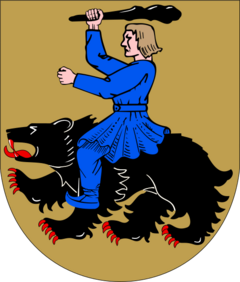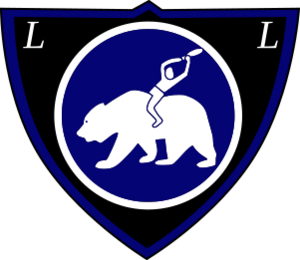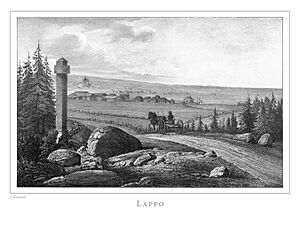Lapua facts for kids
Quick facts for kids
Lapua
Lappo
|
||
|---|---|---|
|
Town
|
||
| Lapuan kaupunki Lappo stad |
||
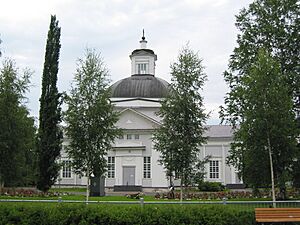
Lapua Cathedral
|
||
|
||
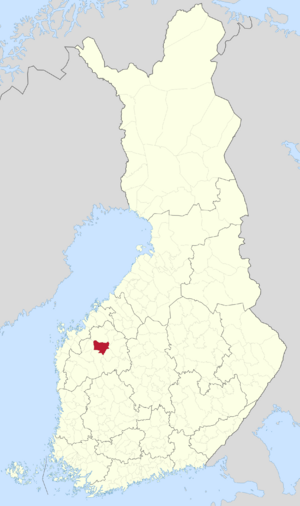
Location of Lapua in Finland
|
||
| Country | ||
| Region | South Ostrobothnia | |
| Sub-region | Seinäjoki sub-region | |
| Charter | 1865 | |
| Market town | 1964 | |
| City rights | 1977 | |
| Area
(2018-01-01)
|
||
| • Total | 751.82 km2 (290.28 sq mi) | |
| • Land | 737.16 km2 (284.62 sq mi) | |
| • Water | 13.67 km2 (5.28 sq mi) | |
| Area rank | 115th largest in Finland | |
| Population
(2023-12-31)
|
||
| • Total | 14,024 | |
| • Rank | 79th largest in Finland | |
| • Density | 19.02/km2 (49.3/sq mi) | |
| Population by native language | ||
| • Finnish | 95.9% (official) | |
| • Swedish | 0.2% | |
| • Others | 3.9% | |
| Population by age | ||
| • 0 to 14 | 17.8% | |
| • 15 to 64 | 57.6% | |
| • 65 or older | 24.6% | |
| Time zone | UTC+02:00 (EET) | |
| • Summer (DST) | UTC+03:00 (EEST) | |
Lapua (which is pronounced LAH-poo-ah in Finnish, and called Lappo in Swedish) is a town and municipality in Finland. It is located in the South Ostrobothnia region, right next to the Lapua River.
Lapua is home to about 14,024 people. The town covers an area of 751.82 square kilometres (290.28 sq mi), with some of that being water. Most people in Lapua speak Finnish.
Contents
History of Lapua
Early Settlements
Around the early 1300s, people started to settle permanently in the Lapuanjoki River Valley. These settlers came from other parts of Finland, looking for good land and water connections. At first, many people settled closer to the sea.
Some Sámi people lived in the Lapua area during this time. They saw the region as their wilderness. The name Lapua might have come from the coastal Swedes, who called the Sámi people "Lapps."
The Finnish War
A famous battle, called the Battle of Lapua, happened near the town on July 14, 1808. This battle was part of the Finnish War, fought between Swedish and Russian forces.
Lapua Cathedral
Lapua is an important center for the Evangelical Lutheran Church of Finland. The beautiful Lapua Cathedral is located here. It was designed by Carl Ludvig Engel and finished in 1827.
The Lapua Movement
In 1929, a group called the Lapua Movement was started in Lapua. This group was against communism. They became very powerful in the town.
The Lapua Movement held large meetings and marches in the town center. Many people came to support them. Their leaders, like Vihtori Kosola and Vilho Annala, were based in Lapua.
On October 30, 1930, they organized the Lapua March. Thousands of their members marched through Lapua. They were protesting against certain government policies. The Lapua Movement was later made illegal in 1932. Another group, the Patriotic People's Movement, took its place.
Lapua State Cartridge Factory
Lapua is also known for its large ammunition factory. It started in 1927 as the State Cartridge Factory. This factory made most of the ammunition for the Finnish Army. It was very important during the Winter War and World War II.
On April 13, 1976, an accident happened in a warehouse at this factory. Sadly, many employees were lost. After this event, the factory was moved about 6 kilometers (about 4 miles) away from the town center.
Today, the factory continues to make ammunition as Nammo Lapua. It is part of a larger company called the Nordic Ammunition Group (Nammo). The original factory buildings are now used as an arts center, a library, and a theater.
International Friends
Lapua has special friendships with other towns around the world. These are called twin towns or sister cities.
Lapua is twinned with:
- Hagfors, Sweden
- Hohenlockstedt, Germany
- Lantana, Florida, United States
- Rakvere, Estonia
- Kiskőrös, Hungary
Notable People from Lapua
Many interesting people have come from Lapua, including:
- Juho Annala
- Vilho Annala
- Johannes Gabriel Granö
- Anneli Jäätteenmäki
- Vihtori Kosola
- Teemu Mäki
- Esko Nikkari
- Jutta Urpilainen
- Jukka Haapalainen
See also
 In Spanish: Lapua para niños
In Spanish: Lapua para niños
 | Lonnie Johnson |
 | Granville Woods |
 | Lewis Howard Latimer |
 | James West |


